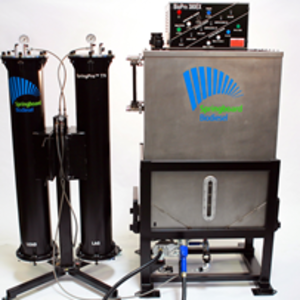US military base in Afghanistan to make biodiesel from UCO

Photo: Springboard Biodiesel
March 25, 2015
BY Springboard Biodiesel
Springboard Biodiesel announced March 25 that it has been selected to provide its turn-key, small-scale biodiesel processing system to Bagram Airfield in the Parwan Province of Afghanistan.
Springboard Biodiesel’s BioPro 380EX and SpringPro T76 comprise a small-scale biodiesel processing system designed to inexpensively convert the base’s used cooking oil (UCO) into ASTM-grade biodiesel that can then be used in diesel vehicles on base.
“Springboard is excited to provide this made-in-the-USA, clean technology solution to the U.S. military,” said Springboard Biodiesel CEO Mark Roberts. “In Afghanistan, the fully burdened cost of diesel fuel is extremely high. We’ve heard estimates north of $10 per gallon. The BioPro systems made by Springboard will enable the base to produce high-quality biodiesel fuel for less than $1 per gallon—not to mention, biodiesel made from used cooking oil burns up to 90 percent cleaner than regular diesel.”
Springboard Biodiesel has worked with a large number of institutions that have access to UCO. “We refer to these groups as ‘Captive Kitchens,’” Roberts said, “meaning that as a natural consequence of their mission, they cook for large groups of people—schools, restaurants, hotels, prisons, casinos and, of course, military bases, where there is the added element of fuel security. Making a cleaner-burning fuel, safely and inexpensively on-site, gives these groups a huge advantage. We’re hopeful that the success of Bagram’s small-scale biodiesel production initiative will resonate with other bases that want to copy the model.”
Advertisement
Springboard Biodiesel has been building automated, small-scale biodiesel production systems since 2008 and has more than 1,000 of its systems operating in all 50 states and now in 24 countries. The company estimates that the cumulative biodiesel production capacity enabled by its systems surpasses 7.5 MMgy, which results in a CO2 emissions reduction of approximately145 million pounds annually.
Advertisement
Related Stories
The USDA reduced its estimate for 2024-’25 soybean use in biofuel production in its latest WASDE report, released May 12. The agency expects soybean oil use in biofuel to increase during the 2025-’26 marketing year.
HutanBio's microalgal biofuel production shown to be net-negative in an independent life cycle assessment by EcoAct
HutanBio on May 8 announced that the production process for its proprietary HBx microalgal biofuel achieves net-negative carbon emissions, based on an independent cradle-to-gate life cycle assessment (LCA) conducted by EcoAct.
According to a new economic contribution study released by the Iowa Renewable Fuels Association on May 6, Iowa biofuels production has begun to reflect stagnant corn demand throughout the agriculture economy.
Repsol and Bunge on April 25 announced plans to incorporate the use of camelina and safflower feedstocks in the production of renewable fuels, including renewable diesel and sustainable aviation fuel (SAF).
U.S. operable biofuel capacity in February was unchanged from the previous month, according to data released by the U.S. EIA on April 30. Feedstock consumption for February was down when compared to both January 2025 and February 2024.
Upcoming Events










